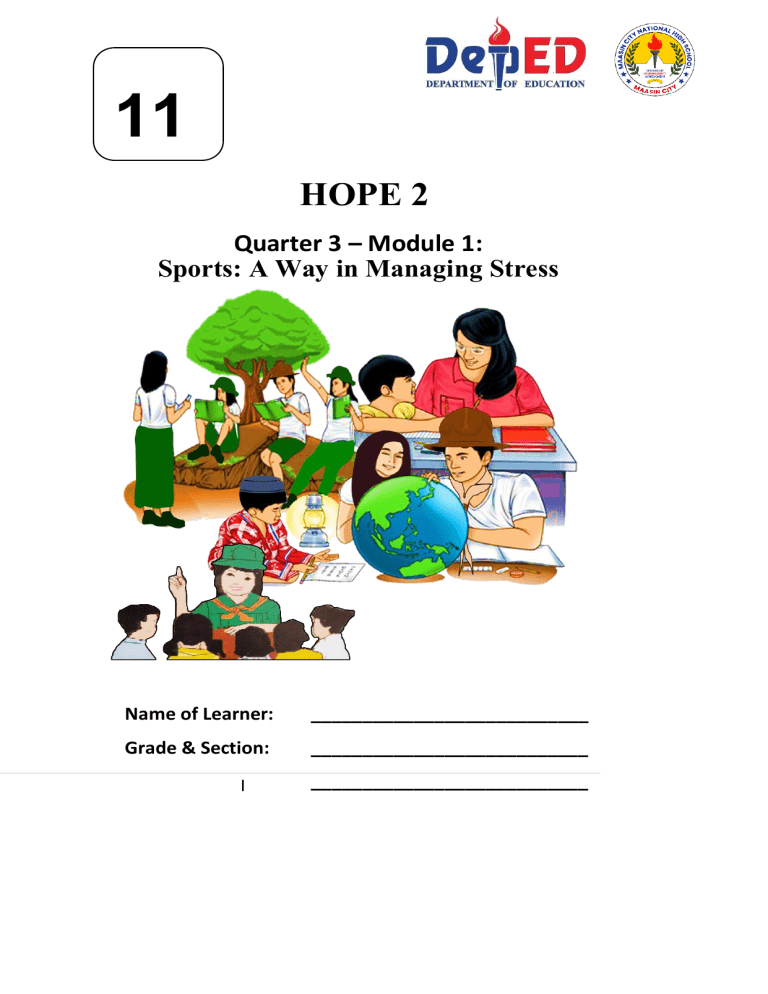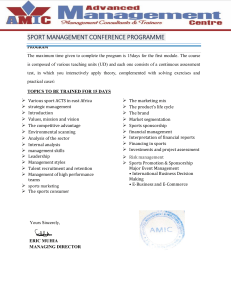
11 HOPE 2 Quarter 3 – Module 1: Sports: A Way in Managing Stress Name of Learner: ___________________________ Grade & Section: ___________________________ | ___________________________ WHAT I NEED TO KNOW Teenagers have a lot of thinking on their minds about the situations happening during this pandemic. Staying healthy is not a priority to them since they focus most of their time staying at home, doing some household chores and attending online classes. Many thinks that adding another activity to what they may feel like is already a heavy load, may be stressful. However, what many of them may not realize is that participating in sports can be an incredible way of reducing stress. Sport plays a very important part in our life and it is becoming more and more popular. Doing sports keeps us healthy, relaxed, as well as maintains our figure and strengthens our patience and endurance. All doctors recommend exercising, as prevention and convalescence of various ailments. After going through this module, you are expected to: 1. Describe the role of physical activity assessments in managing one’s stress; PEH11FH-IIf-5 WHAT’S IN Activity 1: Sports Participation Have you participated in any sports? If yes, list the sports and describe your participation. If no, explain briefly the reason in the table below. Use a separate sheet for your answer. YES List of Sports Participated Describe Your Participation in the Sports NO Reason: WHAT’S NEW https://cutt.ly//lhAA6Gr BIG IDEA When you exercise, your body releases chemicals called endorphins. These endorphins interact with the receptors in your brain that reduce your perception of pain. WHAT IS IT STRESS Stress has been defined as the experiencing of unpleasant or uncomfortable feelings. But, not all stress is bad. In fact, our lives would be a little bit boring if it were not for some amount of stress. The key is for you not to let the stress control you, but for you to control the stress. TWO TYPES OF STRESS 1. Eustress – the positive stress, is beneficial in attaining best performance. 2. Distress – the negative stress, is detrimental to performance. SIGNS AND SYMPTOMS OF STRESS Physical Signs • • • • • • • • Muscle tension Headache Pounding heart Shortness of breath Increased sweating Dry mouth Skin rush Grinding teeth, nail biting Emotional Signs • • • • • • • • • • Anger, irritability Impatience Nervousness Forgetfulness Inability to concentrate Negative thinking Excessive worrying Loss of interest Self-criticism Frequent crying Behavioral Signs Psychological Signs Loss of appetite Overeating Drug abuse Sleep problems Restlessness Hurrying and talking too fast • Criticizing others • Reckless behavior • Fidgeting • Constantly irritable with other people • Feeling of being a failure • Difficulty in making decisions • Loss of interest in other people • Having a hard time to concentrate • • • • • • MEANS OF HOW PLAYING SPORTS HELPS AS A WAY TO RELIEVE STRESS 1. Sports stimulate the body production of endorphins. Physical activities such as sport stimulate the body’s production of chemicals that are responsible for the positive changes in an individual’s mood. These neurotransmitters are called endorphins, and at heightened levels, they cause a “feel-good” response. In fact, this feeling helps to release a tension. 2. Sports engagement increases self-esteem. Improved self-esteem can dramatically reduce your overall levels of stress. Being a part of a team is an amazing way to build one’s self-esteem; when you are more confident in your own abilities you feel better about yourself. Sports can improve your confidence when meeting goals that you have set for yourself. Sports promote individuals to feel positive about themselves. Though competition, they discover their own potential to do better and to hold themselves to a higher standard. People who are active in sports generally have healthier bodies. For teens who are not happy with their self-image, having a body that is fit is great for self-confidence. 3. Sports can relieve mental stress by promoting better sleep. Study have shown that sports and exercise can decrease mild symptoms of depression and even improve the quality of sleep. The quality of your sleep has been linked to your sense of well-being. The more sleep you get, the better you feel. Lack of sleep can be frustrating and lead to anxiety. The physical activity that is received from playing sports can help increase sleep duration. 4. Sports participation promotes socialization. A great way of managing stress is through socializing. Socialization helps relieve stress by promoting the hormone oxytocin which promotes relaxation, thus reducing anxiety. Playing a sport, mainly a team sport, give you the opportunity to make new friends who share a common interest. Being around others who share a mutual goal motivates you. This motivation can significantly relieve anxiety and steer you away from depression. Involvement in team sports has been associated with social acceptance which can be further nurtured through positive coaching and support from team members. COUNTERPRODUCTIVE COPING STRATEGIES Coping is defined as the “capacity to respond and recover from something stressful” (WHO 1999). Coping is the conscious response to psychological stress in an attempt to balance mental and emotional conditions. Stressors are commonly labeled as negative incidents in life, like loss of family members or love ones, separations and loss of a job. However, there are also positive life changes like birth, marriage, and finding a new job. Both positive and negative incidents need coping skills that will accommodate these changes in life. These include how to behave, thinking of ideas and controlling emotions in order to minimize or tolerate stressful events. COPING STRATEGY 1. Pattern breaking - Used when an athlete falls into a negative mental state due to uncontrolled mental imagery. - A “pattern breaker” is a word or phrase that an athlete can say mentally in their mind, or alternatively, their coach or a significant other can say out loud to them. 2. Mental Imagery - Otherwise referred to as visualization or mental rehearsal, is a strategy commonly employed. - Athletes used this technique to familiarize themselves with their competition environment, a difficult pattern to play, or even to repeatedly visualize the course route. WHAT’S MORE Activity 2: Sport that I like! DIRECTIONS: From the given sports below, select four (4) sports that you liked the most. Explain how it helps you overcome your stress. COMMON SPORTS Arnis Chess Softball Badminton Dance Sport Soccer Basketball Football Swimming Baseball Lawn Tennis Volleyball 1. SPORT: _______________________________ ___________________________________________________________________________ ___________________________________________________________________________ ___________________________________________________________________________ ___________________________________________________________________________ 2. SPORT: _______________________________ ___________________________________________________________________________ ___________________________________________________________________________ ___________________________________________________________________________ ___________________________________________________________________________ 3. SPORT: _______________________________ ___________________________________________________________________________ ___________________________________________________________________________ ___________________________________________________________________________ ___________________________________________________________________________ 4. SPORT: _______________________________ ___________________________________________________________________________ ___________________________________________________________________________ ___________________________________________________________________________ ___________________________________________________________________________ Activity 3: WHAT I HAVE LEARNED DIRECTIONS: Answer the question briefly. 1. Why is it significant to overcome stress? ___________________________________________________________________________ ___________________________________________________________________________ ___________________________________________________________________________ ___________________________________________________________________________ ___________________________________________________________________________ ___________________________________________________________________________ ___________________________________________________________________________ ___________________________________________________________________________ ___________________________________________________________________________ ___________________________________________________________________________ 2. Why you need to participate in sports activities? How these sports activities will help you overcome the effects of stress? ___________________________________________________________________________ ___________________________________________________________________________ ___________________________________________________________________________ ___________________________________________________________________________ ___________________________________________________________________________ ___________________________________________________________________________ ___________________________________________________________________________ ___________________________________________________________________________ ___________________________________________________________________________ WHAT I CAN DO Activity 4: Let’s play! DIRECTONS: From the selected sport in activity 3: Find out, you are now to select one (1) specific sport. Execute /demonstrate it at home or in your community observing the safety protocols of InterAgency Task Force (IATF) on COVID-19. Answer the questions using the Venn Diagram below. Did the sport helps me manage my stress? How will I promote sports to overcome stress? ASSESSMENT DIRECTIONS: Read each statement carefully. Choose the letter of the best answer. Write TRUE if the statement is correct and FALSE if the statement is wrong. Write your answer on the space provided before each number. _________ 1. Major life changes are not stressful. _________2. Stress can be positive if it helps you escape from danger, promotes personal growth, or helps accomplish goals. _________3. When a person feels too overwhelmed by stress, they should always just handle it on their own. _________4. Stress can sometimes lead you to perform at your best. _________5. Participating in any sports is a good way to reduce stress. _________6. Stress is how the brain and body respond to any demand. Every type of demand or stressor-such as exercise, work, school, major life changes, or traumatic events- can be stressful. _________7. Stress disrupts memory. _________8. Physical activities help reduce stress, and it adds to your total sense of well-being. _________9. Mental health is defined as a state of well-being in which every individual realizes his/her own potential and can cope with the normal stresses of life. _________10. Your body does not know the difference between a physical stressor and an emotional/psychological stressor. It reacts the same to both. KEY ANSWER: ASSESSMENT
